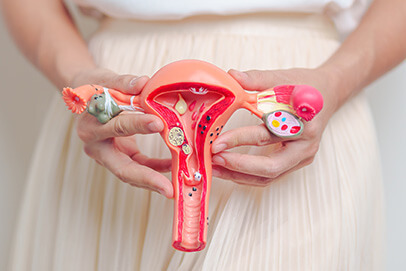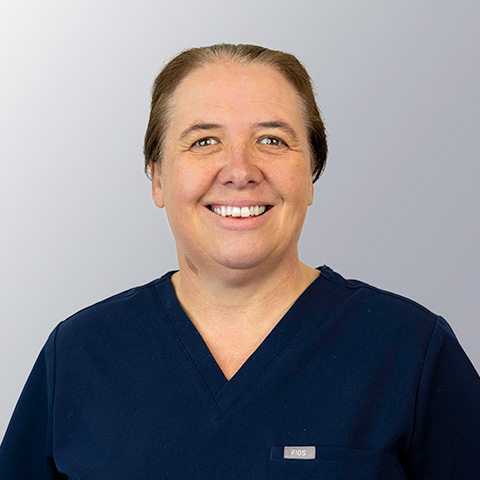Compassionate care through every stage of menopause
Menopause is one of the biggest transitions in a woman’s life.
No two women are the same as far as menopause is concerned but generally, menopause occurs between the ages of 45-55 years.
Oestrogen production in the ovaries slows down and finally stops. As ovaries become older, they become less efficient which leads to significant hormonal changes.
For some women, periods stop without any symptoms, although for others, perimenopause and menopause can be a time filled with uncomfortable and painful symptoms lasting for years.
Changes in hormone levels can begin years before menopause starts. The good news is, your GP can help with ongoing medical advice and hormonal treatments, to help manage this phase of life as effectively and comfortably as possible.
The 3 stages of menopause

Perimenopause
Perimenopause is the transitional phase before menopause, often beginning in a woman’s 40s but sometimes starting earlier. During this time, hormonal changes can lead to symptoms like irregular periods, hot flashes, mood changes, and sleep disturbances.

Menopause
Menopause is marked by the end of menstrual periods (no periods for 12 consecutive months) and typically occurs around age 50. When menopause begins, the symptoms that have been experienced in the perimenopause stage, tend to increase in intensity.

Postmenopause
Postmenopause refers to the stage of life following menopause, lasting for the rest of a woman’s life. By this time, many menopause symptoms have eased, but the lower levels of oestrogen can increase the risk of cardiovascular disease, osteoporosis, and weight gain.
Menopause symptoms
While no two women are the same, some common symptoms of menopause may include the following:
It can be difficult to diagnose perimenopause, as changes in hormones occur throughout a woman's life at different times of her cycle and may result in similar symptoms.
It’s important that if you’re of perimenopausal age and you start to regularly suffer with any changes in your body, that you make an appointment with your GP.
There’s no way to avoid menopause, however the symptoms of menopause can often be managed very effectively with regular treatments prescribed by your GP. If you think you’re experiencing the symptoms of menopause or perimenopause, book an appointment with a GP with additional expertise in menopause.
Tailored treatments and guidance for menstrual disorders
Menstrual disorders cover a variety of conditions that can impact daily life and overall health. Common issues include irregular cycles, heavy bleeding (menorrhagia), painful periods (dysmenorrhea), premenstrual syndrome (PMS). Some women experience more complex conditions like premenstrual dysphoric disorder (PMDD) and polycystic ovary syndrome (PCOS). These conditions can arise from a range of possible causes, including hormonal imbalances, lifestyle factors, stress, or underlying health conditions.
GP's consulting from our rooms work closely with patients to determine treatment plans aimed at alleviating symptoms, restoring hormonal balance, and improving overall wellbeing. Whether you’re managing the symptoms of PCOS, experiencing severe premenstrual changes with PMDD, or dealing with other menstrual concerns, we’re here to support you with empathy, expertise, and a commitment to enhancing your quality of life.
Types of menstrual disorders

PMS / PMDD
Premenstrual Syndrome (PMS) and Premenstrual Dysphoric Disorder (PMDD) are conditions that can affect women in the days or weeks leading up to their menstrual period. PMS involves physical and emotional symptoms like bloating, mood swings, fatigue, and irritability. PMDD is a more severe form of PMS and can cause intense emotional symptoms, including severe mood swings, anxiety, and depression, significantly impacting daily life.

PCOS
Polycystic Ovary Syndrome (PCOS) is a hormonal disorder affecting many women of reproductive age. Characterised by a range of symptoms, including irregular menstrual cycles, excess androgen (male hormone) levels, and the development of small cysts on the ovaries, these hormonal imbalances can lead to issues such as weight gain, acne, excessive hair growth, and, in some cases, difficulties with fertility.

Heavy Periods
Heavy periods, medically known as menorrhagia, are menstrual cycles with excessive bleeding that lasts longer than usual or requires frequent pad or tampon changes. Women with heavy periods may pass large blood clots and experience symptoms like severe cramps, fatigue, or even anemia due to blood loss. Causes of heavy periods can include hormonal imbalances, uterine fibroids, polyps, or certain health conditions.
Symptoms of menstrual disorders
Menstrual disorders like PMS, PMDD, PCOS, and heavy periods can significantly impact daily life and well-being. GP's consulting in our rooms can help with personalised medical treatments to address these conditions, working closely with each patient to find the right approach.
Premenstrual Syndrome (PMS) & Premenstrual Dysphoric Disorder (PMDD): Treatment for PMS and PMDD may involve lifestyle guidance, nutritional support, and medications to help manage mood swings, bloating, fatigue, and other symptoms. In more severe cases, hormonal treatments or antidepressants may be recommended to reduce the emotional impact of PMDD.
Polycystic Ovary Syndrome (PCOS): PCOS treatment at Robina Town Medical Centre focuses on balancing hormones and managing symptoms. This may include hormonal contraceptives to regulate cycles, medications to manage insulin levels, or specific treatments for acne and hair growth. Our team also provides support for lifestyle changes that can improve overall health, such as nutrition and exercise guidance.
Heavy Periods (Menorrhagia): For patients with heavy periods, treatment options range from medications to reduce bleeding, like nonsteroidal anti-inflammatory drugs (NSAIDs) or hormonal therapies, to more targeted approaches such as the use of an intrauterine device (IUD) to help regulate flow. In some cases, minimally invasive procedures may be recommended.
Our approach at Robina Town Medical Centre is personalised and compassionate, ensuring that each patient receives the care, support, and information they need to manage their symptoms effectively and enhance their quality of life.
GP's with a special interest in Menopause and Menstrual Disorders
Dr Annelies Geissler
Practice Principal
Dr. Annelies Geissler is a highly qualified and compassionate GP with a genuine desire to make a difference in the lives of her patients. Dr Annelies's qualifications include additional training in menopause and menstrual disorders, visit Dr Annelies profile.
Dr Hannah Horvath
Practice Principal
Dr Hannah Horvath offers comprehensive, individualised care ensuring each patients' physical and emotional wellbeing is a priority. Dr Hannah has undertaken additional training in menopause and menstrual disorders. For more details visit Dr Hannah's profile.
Dr Colinette Margerison
GENERAL PRACTITIONER
Dr. Colinette Margerison provides dedicated care for women with a focus on menopause, menstrual conditions and women’s health. She has additional qualifications in menopause management and extensive experience in gynaecology and medical education. For more details, visit Dr. Colinette’s profile.
We are here to help
Navigating menstrual disorders and menopause/perimenopause can be challenging, but you don’t have to go through it alone. At Robina Town and Easy T Medical Centres, our menopause and menstrual disorder clinic offers compassionate, friendly care tailored to your unique needs.
GP's practising from our clinic can provide advice and guidance, helping you manage symptoms, improve your well-being, and protect long-term health.
We take a whole patient approach, offering treatment options, lifestyle guidance, and preventive care. Choose Robina Town Medical Centre to experience dedicated care.
You can book an appointment with your regular GP, however the Doctors listed above have a special interest in menstrual disorders and menopause (including perimenopause and post menopause).

Fees
Long Consultation
30 minutes
Fee: $180
Medicare Rebate: $84.90
Out-of-pocket: $95.10
FAQs
We’ve prepared a range of frequently asked questions about menopause and menstrual disorders. Click on each question to display the answer.


